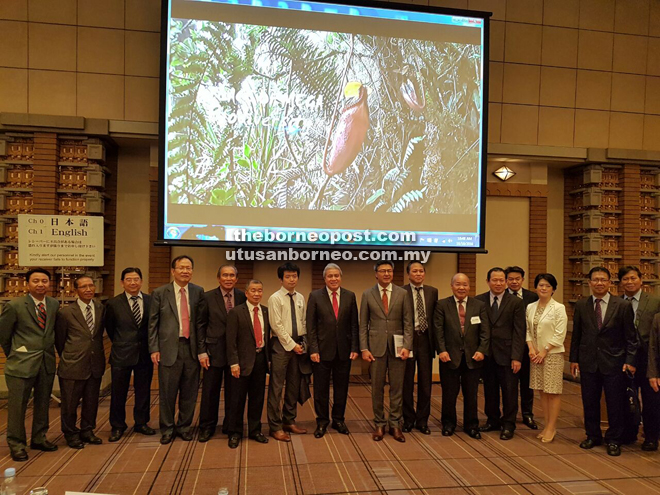
Awang Tengah (eighth left) with Sarawak delegates at the Sarawak Timber Legality Verification System seminar in Tokyo.
KUCHING: The state government takes stringent steps to ensure that timber and timber products exported from Sarawak are from legal sources.
Second Minister of Resource Planning and Environment Datuk Amar Awang Tengah Ali Hasan stated this at the opening of the Sarawak Timber Legality Verification System seminar in Tokyo yesterday.
The seminar was organised by the Sarawak state government in collaboration with Sarawak Timber Association (STA).
“I want to assure you the timber products that are exported have gone through our Timber Legality Verification System and are therefore legal.” he said.
He pointed out that Japan has been Sarawak’s trading partner since the 1950s and Japan remains an important market for its timber, petroleum, crude petroleum, LNG and pepper exports.
He said the state government intended to maintain and sustain this long established relationship which has built the confidence and trust in each other’s standard and requirement.
He disclosed that in 2015, Sarawak’s export to Japan was RM2.6 billion (USD 618 million), which accounted for 39 per cent of Sarawak’s total export earnings of RM6.6 billion (USD 1.6 billion).
He said more than 80 per cent of the export was plywood and the timber industry had contributed significantly to the socio-economic development of Sarawak.
He also revealed that in 2015, the government collected forest revenue of RM617.36 million (USD 147 million) with export earnings from timber and timber products of about RM6.57 billion (USD 1.6 billion).
In addition, the forestry and timber industry sectors provided jobs to over 150,000 people in Sarawak directly and indirectly, he further said.
On a related subject, Awang Tengah pointed out that the State recognised the value and the significant role of forests, saying that was why the state government was committed to ensuring that its forest resources were sustainably managed.
He assured that Sarawak has a very clear land use policy which takes into consideration all aspects of economic development, social wellbeing and environmental balance and integrity.
“This policy includes three main sectors — that is forestry, agriculture and other land uses. For forestry, the government has targeted six million hectares of land as Permanent Forest Estates including planted forest and one million hectares as Totally Protected Areas,” he said.
He also pointed out that the state government was aware that NGOs had been going around trying to influence consumers against buying timber products from Sarawak.
“They paint a negative picture of Sarawak. They say that we destroyed our forests and the wildlife. This is far from the truth as you very well know our state has a land mass of 12.4 million hectares, and 65 per cent is still under forest cover. We know that any negative impact to the environment would directly and negatively affect us. We would be the first to suffer. That is why we put our priority in protecting the forest, environment and wildlife,” he stressed.
He also assured the participants that the Sarawak government managed its forest based on the principles of Sustainable Forest Management (SFM).
“We are clamping down on illegal logging. That is why we strengthen our enforcement to combat and eliminate illegal logging activities. I am happy to tell you that industry players are with us,” he said.
He told the audience that the state government was collaborating with reputable international organisations, such as World Wide Fund for Nature (WWF), Wildlife Conservation Society (WCS) and International Tropical Timber Organisation (Itto) in working out plans and practices for sustainable forest management and conservation of forests and biodiversity in the State.
“The state government of Sarawak has signed a memorandum of understanding in 2012 with 11 universities and research institutions in Japan to undertake research in the Totally Protected Areas (TPAs) within the State. Among them are Tohuku University, Ehime University, Kochi University, Kyoto Institute of Technology, Osaka University, Tokyo University, Yamaguchi University and Utsonomiya University,” he said.
Awang Tengah said the government would continue to work closely with these bodies in the pursuit of the State’s goals of good, sustainable management of its natural resources and having a timber industry which is not tainted by corruption or any form of malpractices.
Among those in his delegation were Assistant Minister for Resource Planning Datuk Mohd Naroden Majais, Assistant Minister for Rural Economy (Coastal Areas) and Fisheries Datuk Julaihi Narawi, Assistant Minister for Environment Datu Len Talif Salleh, Assistant Minister for Agriculture Malcom Mussen Lamoh, Ministry of Industrial and Entrepreneur Development, Trade and Investment permanent secretary Datu Liaw Soon Eng, Ministry of Resource Planning and Environment permanent secretary Datu Sudarsono Osman, STIDC general manager Datu Sarudu Hoklai and STA honorary secretary Dato Henry Lau Lee Kong.
